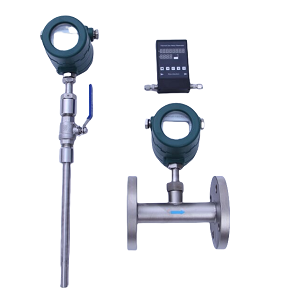Understanding Insertion Mass Flow Meter: An Efficient Gas Flow Measurement Solution
An insertion mass flow meter, also known as an insertion
thermal gas flow meter, is a vital tool in the field of gas flow measurement. This instrument offers a unique and efficient method to accurately measure gas flow rates. In this article, we will delve into the working principle, measurement of gas types, technical specifications, and advantages of using insertion mass flow meters.
Working Principle and Gas Type Measurement by insertion mass flow meter
The insertion mass flow meter operates on the principle of thermal dispersion. It measures the mass flow rate of gases by utilizing the cooling effect of a gas stream on a heated probe. As the gas flows past the heated probe, it absorbs heat, and the sensor compensates by increasing the power to maintain a constant temperature. The power required to maintain the temperature is directly proportional to the mass flow rate, allowing for accurate measurement.
This insertion mass flow meter can measure various gas types, including but not limited to air, nitrogen, oxygen, natural gas, biogas, LPG, and other industrial gases. The principles remain the same regardless of the gas type, making it a versatile solution for a wide range of gas mass flow measurement applications.
Technical Specifications and Advantages of Using Insertion Mass Flow Meter
-
Measurement Range: Insertion mass flow meters typically have a broad range, accommodating both low and high flow rates, providing flexibility in various applications.
-
Accuracy: These insertion mass flow sensors offer high accuracy in measuring gas flow rates, which can keep 1% accuracy in gas measurement, ensuring precise and reliable data for critical processes.
-
Installation: They are designed for easy installation, even in existing pipelines, using insertion-style sensors.
-
Output and Communication: Most insertion mass flow meters provide multiple output options such as analog or digital, ehancing integration and data accessibility.
Advantages of Using Insertion Mass Flow Meter
-
Cost-Effective Solution: Insertion mass flow meters are often more cost-effective than full-bore meters, making them an economical choice for many industrial applications, it is very low price cost mass flow meter for large pipelines or ducts, such as 8 inch, 10”,12 inch, or 20 inch gas pipelines.
-
Versatility: They can be installed in various pipe sizes and materials, making them adaptable to different setups and environments.
-
Minimal Pressure Drop: Due to their design, insertion mass flow meters impose minimal pressure drop within the pipe, ensuring efficient gas flow without compromising the system's performance.
-
Real-Time Monitoring: These insertion mass flow transmitters provide real-time flow data, enabling prompt adjustments and optimization of processes for enhanced efficiency.
Conclusion
Insertion mass flow meters, based on the principle of thermal dispersion, offer an efficient and accurate method for measuring gas flow rates. Their technical specifications, ease of installation, versatility, and cost-effectiveness make them a valuable tool for a wide array of applications. With the ability to measure various gas types and provide precise, real-time data, insertion mass flow meters are indispensable instruments in the realm of gas flow measurement.


